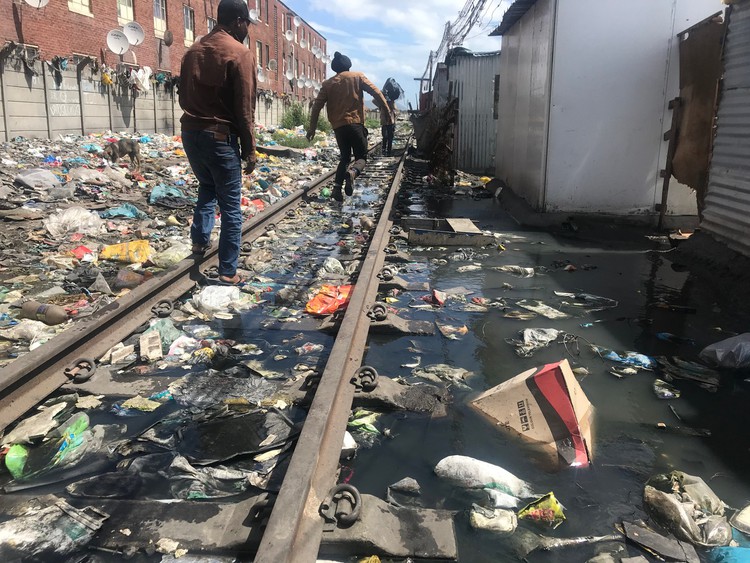Race against the clock to meet court deadline to move railway families
Court ruled that families living along the railway line in Langa must be shown new site four weeks before being moved
Shacks built along an old railway line in Siyahlala informal settlement in Langa Cape Town. Archive photo: Tariro Washinyira
- Families living along the railway line in Langa are likely to remain there a few more weeks.
- This is despite a looming deadline set by the Western Cape High Court earlier this year, ordering PRASA to relocate the occupiers to suitable land by 26 November.
- The court ordered that the occupiers must be allowed to see the site at least four weeks before the relocation, but a community leader we spoke to claims this has not yet happened.
- The Housing Development Agency is to set up emergency housing units for the families at a site in Eerste River.
- The shacks on the line are preventing Metrorail from operating the Central Line beyond Langa.
Families whose shacks are built on the railway line in Langa, Cape Town are likely to remain there for a few more weeks. This is despite a looming deadline set by the Western Cape High Court earlier this year, ordering the relocation of the occupiers.
Siyahlala informal settlement was established in 2016 on Passenger Rail Agency of South Africa (PRASA) owned land and then expanded towards the train station, along the railway tracks.
PRASA started talking to the occupiers in January and February to urge them to vacate the land.
On 30 July, the court granted PRASA an order for the Siyahlala families to be moved and housed. The order states that the families should be moved by 26 November, and that the new site should have housing and basic services. The court also ruled that the families must be allowed to visit the new land at least four weeks before the relocation. Those refusing to be resettled could be forcibly removed.
In August, GroundUp reported that two pieces of land in Eerste River and Stellenbosch had been identified, where the Housing Development Agency (HDA) intends to build over 2,000 emergency housing units for the Siyahlala families.
On Wednesday, community leader Nomzomo Gatuya said people are looking forward to being moved to Eerste River. In the last meeting on 20 October with PRASA, Gatuya said leaders had been informed that the families might instead instead be relocated to in Philippi.
“We are worried. It’s only a few days to 26 November and leaders have not yet been taken for a site visit. In September at Monwabisi Community Hall in Langa PRASA promised to give us a date for the visit to the relocation place but we haven’t heard anything,” she said.
Asked about progress on the relocation, PRASA spokesperson Andiswa Makanda said, “We are in the final stages of the process and any changes will be communicated to the relevant people including affected residents.”
HDA spokesperson Katlego Moselakgomo told GroundUp that plans to move the group to Eerste River are still on track. “The affected communities have and are continuously being engaged on plans at every stage of the relocation and development processes.”
Earlier this month Moselakgomo said that the HDA had identified 1,073 structures with about 2,055 people who would require relocation from areas along sections of the central railway line passing through Langa, Philippi and Khayelitsha.
“This railway line is a critical economic node for local commuters, especially to poorer communities. It has since been unusable due to the illegally erected informal structures along the railway line in 2020 at the height of the recent lockdowns resulting from Covid pandemic.”
He said the aim was to provide temporary housing solutions immediately and permanent solutions for the long term.
He said that identifying, acquiring and preparing land for development involved several processes, including a feasibility study, environmental impact assessment, earthworks and engineering. The City of Cape Town is giving guidance to the technical team on the most suitable by-laws to follow for the process, Moselakgomo said.
Support independent journalism
Donate using Payfast

Next: New Covid treatments might be slow to arrive in SA
Previous: CPS has still not revealed how much profit it made from social grants contract
© 2021 GroundUp. This article is licensed under a Creative Commons Attribution-NoDerivatives 4.0 International License.
You may republish this article, so long as you credit the authors and GroundUp, and do not change the text. Please include a link back to the original article.
We put an invisible pixel in the article so that we can count traffic to republishers. All analytics tools are solely on our servers. We do not give our logs to any third party. Logs are deleted after two weeks. We do not use any IP address identifying information except to count regional traffic. We are solely interested in counting hits, not tracking users. If you republish, please do not delete the invisible pixel.

